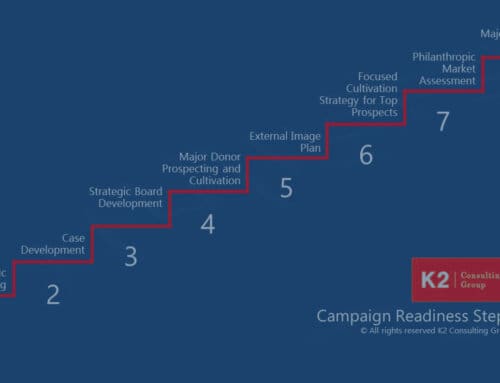Is your organization’s lead fundraising position a revolving door? Here’s what you can do about development officer turnover.
You’re not alone. Our field is marked by some of the highest turnover of any profession. That’s true for organizations of every size and sector.
A few facts:
- Good fundraisers are ambitious, outgoing people; they naturally attract new opportunities.
- There is always a high market demand for effective fundraisers.
- The nature of the business involves artful, quality relationship building and sharing of expertise; again, the best fundraisers are often exposed to new professional opportunities.
All the more reason CEOs, boards and organizations must be prepared to give their DOD the kind of support and they need to help them thrive and stay.
CEOs, board members and candidates can all fight back against the trend: by understanding the real causes of turnover, leaders can employ smart hiring practices and candidates can learn to evaluate job fit more effectively. In this three-part blog will explore all of the above:
Part I: Documenting the real challenge and placing responsibility where it belongs
Part II: How development candidates can discern if a position will lead to success
Part III: How top leaders can hire the best and brightest – and fittest
PART I: Hiring for Development: First, a Little Soul Searching
Finding and retaining the right Chief Development Officer (CDO) or Development Director (DOD) is one of the toughest challenges of our sector.
Executives report that significant numbers of development directors lack key fundraising skills, and sometimes that’s the case. But here’s the hidden truth: just as often, the problem is that the organization lacks the culture for fundraising to thrive.
The deep challenges of finding and retaining development professionals, and the ways that the gap undermines nonprofits’ success, was documented in a 2014 study conducted by CompassPoint, a national, nonprofit leadership and strategy practice, along with the Evelyn and Walter Haas, Jr. Fund. In “UnderDeveloped: A National Study of Challenges Facing NonProfit Fundraisers,” responses from more than 2700 executive directors and directors of development suggested four main challenges:
- Diluted candidate pool: 53% of executives reported difficulty in finding qualified candidates.
- Long vacancies: the median length of development vacancies is six months; 46% reported even longer vacancies – up to one to two years.
- Performance problems: 25% reported their previous development director was fired because of poor performance or a cultural misfit.
- Fundraisers’ commitment level: 50% of development directors in small organizations anticipated leaving their current jobs in two years or less.
Before saying “Our DOD is not a good fit,” CEOs and board members alike should ask if the organization’s culture is one in which fundraising can thrive.
Key questions:
Do we understand development’s role and the skill sets needed in this organization?
- Does the organization know which fundraising strategies are most effective for the organization, its constituencies, potential funders and culture? One in four directors say their development directors are novices at “donor research,” when of course there are many other more critical skills for a development leader.
- Is the organization hiring a development director based on their program expertise? (e.g. law, child welfare, the arts, education). You might assume that program knowledge is most important and fundraising can be learned…but that can be a challenge if a fundraising coach is not made available and there is little time to learn.
- Is a specific fundraising expertise necessary but the organization hires for another? (Example: The DOD’s strengths are grants or events when individual giving expertise is what’s needed.)
Is the CEO doing his or her part?
- Is the CEO uncomfortable with fundraising and hiring someone who will carry the ball for them? No director, no matter how competent, can fully replace the senior leader.
- Is the development director being called on to manage your board? CEOs must help educate the board on their important role in development. Nearly 75% of study respondents say board engagement is “insufficient,” but only 48% of DOD’s in high performing organizations reported having “a lot of influence” on board participation in fundraising.
- Has the CEO separated himself/herself from fundraising by adding a layer of management between herself and the CDO?
- Does the CEO accept coaching from the DOD?
Have we allocated sufficient resources to development?
- Does your development department have the resources to perform? For example, 32% of organizations with budgets under $1M report having no fundraising database.
- A comprehensive development program is easily a three-to four-person effort. If the organization is budgeting for just a fundraiser and an assistant, you’re probably leaving money on the table.
- Is the development salary competitive enough to attract the skill levels and productivity you seek? Consulting a salary survey might reveal surprises.
Is the environment simply not conducive to fulfilling the job functions?
- Are fundraising expectations realistic? Remember: a peer organization that is raising more may have had a head start; temper expectations to where your organization is now.
- Is leadership signaling that development is less important than operations and programs? Then why would the position appeal to top-level professionals?
- Is the board a bit off course by overreaching into management at the expense of its development role?
- How is the chemistry between CEO and CDO? Maybe not as good as you think: less than half of development directors reported a strong relationship, while execs characterized partnerships as considerably stronger. Style differences can cause friction – or complement each other. The chances of their being in sync are better if expectations are realistic and the CEO participates in fundraising.
Do the findings about turnover seem unreal or isolated to small agencies? If only! But organizations of any size can turn the situation around.
Proceed to Part II of our three-part blog: How development candidates can discern if the position is the right fit.
K2 Consulting Group does not conduct searches. However, we’re happy to consult with CEOs and directors of development who want to design operating plans for development, evaluate internal capacity, or gain insight into the skills, competencies, and characteristics needed for a successful development operation.
Ready to get started on reaching your potential? Contact us to get started.







